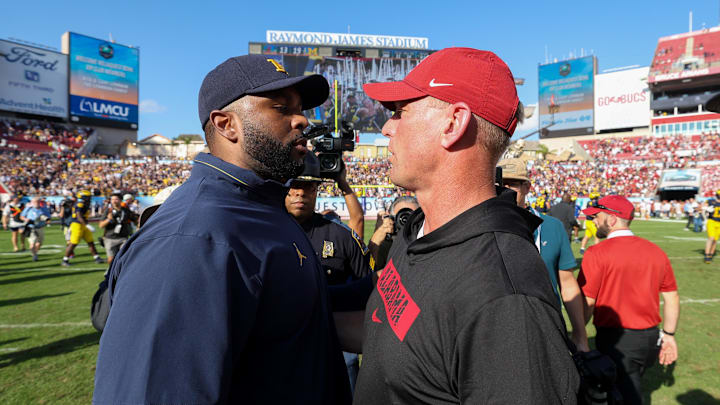The underperformance by the SEC in bowl season has been the talk of college football recently, and Texas A&M football is getting lumped right in the middle of it. The Aggies, of course, dropped a last-second decision to the USC Trojans in the Las Vegas bowl only days ago.
But for the most part, every SEC team has getting it handed to them in their postseason games. LSU overwhelmed a completely outmatched Baylor squad earlier today, but that was sandwiched between disappointing and unexpected losses by Alabama and South Carolina to Big 10 teams.
Carolina had some tough breaks in their game, but Alabama simply looked entirely unprepared. Tennessee, similarly, was completely shellacked by Ohio State in the first round of the playoff after a lot of trash talk by Volunteer fans.
The fact is that on the biggest stages so far for the SEC, teams have fallen face-first over their respective hurdles. Is it fair, though, to consider the Aggies alongside these other teams?
I think it's a little bit of a different story for A&M, in all honesty. This is not to say they shouldn't have won their game— they absolutely should have. But a close look at the game and the circumstances surrounding it tell a different story.
First of all, the sheer number of late scratches for the Aggies was an early sign that A&M was in for some trouble. At kickoff, it was announced that A&M would be without Scooby Williams, Will Lee, Ar'maj Reed-Adams, and Amari Daniels— just to name a few. And this isn't even to mention the defensive line players that the Aggies already lacked due to opt-outs.
Then, you have to consider just how depleted the Aggies were due to transfer and injury. Cyrus Allen and Le'Veon Moss, season-long contributors, were both missing the game after suffering season-ending injury.
This is not to say that it's fine that A&M lost the game— but, all things considered, it's maybe more of a shock that they were as close to winning that one as they ended up. I don't think it's that out of pocket to say that the biggest reason this one felt as bad as it did was the fact that it was A&M losing a huge lead— if we considered all those factors and it was a more normal game progression, I think the result may have been viewed as a little more expected.
There are certainly reasons to criticize the Aggies for this game. But this certainly wasn't the same story of an overwhelming favorite losing to a far overmatched team that we thought leading up to the game, due completely to the Aggie roster losses in retrospect.
